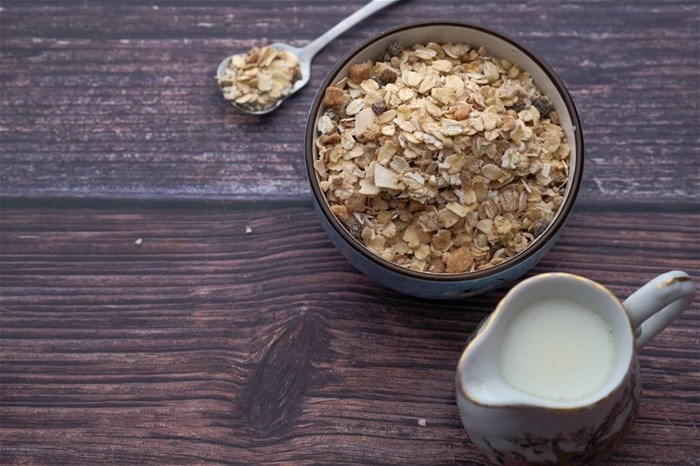Breakfast is widely regarded as the most important meal of the day because of its contribution to nutrition and physical energy. Wholegrain foods, including many commonly consumed breakfast foods, are higher in nutrients such as protein, dietary fibre, micronutrients and bioactives than their refined counterparts.

PepsiCo South Africa, which produces Bokomo oats, Weetbix, Pronutro amongst other products has partnered with the University of Pretoria to release a study on understanding consumer awareness about wholegrains, including what is considered to be wholegrain and the benefits of including it in your daily diet.
To date, for South Africa, a large middle-income country, there is no published data on the actual consumption of wholegrains, which makes it challenging to understand wholegrain trends and patterns among consumers. This is exacerbated by the limited amount of dietary surveillance surveys that exist; and the fact that those that do exist, are not designed to quantify wholegrain consumption.
The research report – South African Consumers’ Knowledge, Opinions and Awareness of WholeGrains and Their Health Benefits – (which was presented at the SAAFoST Congress in Cape Town) shows that whilst most respondents (67%) thought that they were consuming enough wholegrains, the majority (62%) underestimated the recommended level of consumption.
The study, which set out to understand consumers’ wholegrain knowledge, attitudes, and behaviours, used data from 1,000 South African consumers with quotas applied to the sample to ensure it is representative of the South African population on LSM, Race, Gender and Age (18-64 years), aimed to survey those more likely to consume more diverse diets.
Researchers found that 64% of respondents were confident of their wholegrain knowledge. However, 60% of all participants selected incorrect definitions of wholegrains. Whilst most correctly identified common cereals as wholegrains, at most 50% of participants correctly identified common wholegrain foods which include products such as brown rice or quinoa, or bread made from whole-wheat flour.
Furthermore, respondent knowledge regarding wholegrain food attributes and the health benefits of wholegrain consumption was generally poor.
“While it is encouraging to see a good percentage of South Africans are aware of incorporating wholegrains into their diets in general, the level of knowledge as to whether specific food products contain wholegrain ingredients and the quantities required for optimal health, is low,” explains Yulia Berezhnaya, R&D Life Sciences Senior Principal Scientist at PepsiCo SA.
‘It requires multistakeholder collaboration to take place to ensure meaningful change. We need to ensure consistency of definitions used in labelling regulation and dietary recommendations. As a food manufacturer, our task is to develop tasty products that are affordable and accessible to consumers. Government also needs to help with removing VAT on wholegrain and other nutritionally advantaged options,”
Dr. YiFang Chu, Director of Nutrition at Life Sciences at PepsiCo in the United States, also spoke at the SAAFoST Congress, and covered how the scientific research on wholegrains, and more specifically oats has evolved over the years: “It was only in 1997 that the United States Food and Drug Administration (FDA) marked the first food-specific health claim for oats, and this was a landmark moment.”
He further explained that lately research has focused on the impact of oat intake on other health outcomes: “Blood pressure, body mass index and weight, glucose metabolism and type 2 Diabetes have all come into focus, and even more recently there have been investigations linked to oats’ beneficial cardiovascular impact in terms of their prebiotic effect on gut health and how that subsequently contributes towards its cholesterol-lowering effect”.
“Overall, oats can contribute significantly to public health through many positive interlinked health endpoints, and this is why continued scientific research and clinical studies are needed to truly understand the intertwined mechanisms and uncover potential health levers” concludes Chu.
Nutritionally, oats provide many essential nutrients, are a significant source of dietary fibre, soluble fibre mostly as beta-glucan, thiamine, folate, iron, magnesium, copper, and zinc. Additionally, oats are an excellent source of potassium and are low in sodium.
PepsiCo continues to evolve its pepsico positive journey by incorporating more diverse ingredients in both new and existing food products to deliver nutritional benefits, and to help drive positive choices for consumers.
Speaking at a previous event in Cape Town, VP, Nutrition Science at PepsiCo Marianne O Shea explained, “Circumstances should never be a barrier to good nutrition, we [nutrition experts regardless of their sector industry, policy, government] have a responsibility to remove barriers to ensure consumers can access appropriate nutrition and are empowered with the knowledge to make good nutrition choices for themselves and their families”.
The company’s School Breakfast Nutrition Programme which began in 2015, serves breakfast to more than 34,000 children in 35 schools every weekday of the school calendar, across seven provinces in South Africa. Nutritious cereals such as Weet Bix, Bokomo Corn Flakes, and White Star Instant porridge are served to the learners; as well as bowls, spoons, long-life milk and aprons supplied for the food handlers. Learners are thereby assured of at least one wholesome meal a day and can concentrate on their schoolwork. The programme also allows the company to share nutritional information with the learners, and their caregivers.
“It is critical for businesses to invest in Consumer education. Nutrition has become so complex. Convenience has trumped the ‘kitchen logic’ our grandmothers used to have. There is a big opportunity for education, and food and beverage manufacturers such as us, are well-placed to do this”. Says O’Shea.
“As a leading global food and beverage company, we recognize that our company, communities and planet are all inextricably linked, and thus we understand that PepsiCo has a critical role to play in realising a more equitable global food system to ensure the communities we serve are free from hunger and malnutrition. This is at the very heart of our accessible nutrition efforts,” concludes Berezhnaya.